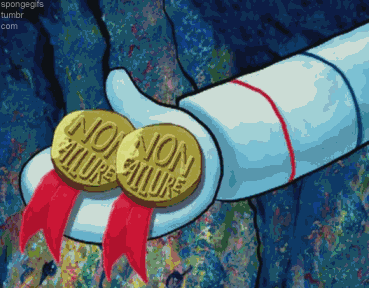ShopDreamUp AI ArtDreamUp
Deviation Actions
In my last article, I talked about the importance of knowing your worth as a photographer (a freelance photojournalist in particular) and the importance of negotiating in the direction of that worth.

There are three principal killers of the artist’s small-business. The number one deathblow is not knowing what you’re worth. The second is allowing yourself to be undermined by not being paid what you’re worth...both addressed in that earlier article...and the third?
Well, the third is not being paid at all. You know what I’m talking about. Like when you go to the mailbox, check your paypal account, and there’s no check, no deposit, even though they promised you.....that’s what I’m talking about. Not being paid at all. It’s frustrating, it’s irritating, it’s killing your cashflow (and your entire business in the process, not to mention your credibility) and something has to be done about it. By you. The artist. Right now.

It’s always nice to be paid immediately. In many circumstance that’s possible (like the dA point system, or etsy, or ebay, etc.), but for some, like when a freelance photographer is working for a company, your invoice goes to the accounts payable department and it gets processed along with all of the other checks a company is scheduled to cut. And sometimes, along the way while waiting for that company to pay you, they don’t pay you at all.
Today I’d like to discuss how to handle that super awkward situation.
Make sure your expectations are clear from the start. The moment both parties agree to a price on a specified product, you draft an invoice. Draft it right then and there on your computer and send a .pdf file copy of the invoice to your client’s email. I prefer email because standard mail is too slow. Remember you want to be paid quickly, so invoice quickly. (Sometimes I send a hard copy in the mail to avoid the whole didn’t-get-the-email drama, but nowadays very few companies request this.)

There are many templates for invoices on the web, and, in fact, most computer word processing programs come with templates for invoices built into them. When I first started my company, I took a template, personalized it, and then saved that copy as a template into my office program. If you streamline the process and make it easier for you, you are more likely to get it done.
Of course, you prefer to be paid immediately, but when that’s not an option, they have a week. If the company has a set schedule for when checks are cut and it falls outside of that week, ask them when that date will be and make that the new due date on the invoice. Companies that can’t pay within a week are more likely to pay an invoice if you allow them to set the specific due date themselves; usually this is never past 30 days of receipt....pretty much all companies cut checks at least once a month...if they don’t...red flag them.
You can’t afford to wait months for a company to pay you so if they’re not in position to pay you for a long time, you need to address this or drop them. Some companies only cut checks and deduct funds when purchase orders reach a certain amount and it’s okay to double check with a company that says they can’t pay you for months and see if that is the case and then ask them to contact you when they are ready. If they need your product now, but you need to be paid before you DIE you can always choose to politely decline the work. Never let yourself be pressured into selling your work for nothing. Some companies actually purchase goods from vendors they are betting will be bankrupt before they get around to paying them. It’s a nasty underhanded way of stealing. Few few companies do this, but they do exist. It’s okay for you to decline work from a company you suspect really does have no intention of paying you. You have worth. Defend it.

Most computers or phones now have reminder programs built into them and so do most accounting programs for home & office like Quicken or Quickbooks. USE THEM. My computer pings me when an invoice is overdue. You think you won’t ever forget to pay yourself, but guess what...life is pretty messy...you do and you probably will. If anything, it’ll help get your nerve up to address the situation. You have an overdue invoice.

Never let anger or frustration get the better of you. Don't send nasty overdue letters with big red writing or stamps or stickers. Avoid phone calls. Absolutely do not make office calls. Think about it. When someone gets nasty or impatient with you, are you more likely or less likely to comply? Here’s the truth: companies are more likely to NOT pay you, just to piss you off (and train you to their expectations), if you’ve embarrassed them or gotten angry with them. Sure, they were initially in the wrong, but it’s human nature to react negatively to other negative reactions. It’s also going to undermine your professionalism. Don’t show your anger...ever... even if you do feel that way.
Understand that there are right ways to address awkward situations and wrong ways. There’s a reason I conduct a lot of my business via email. 1. It provides a written account of the transaction and negotiations that I can keep and refer back to if I need to in the future. 2. It’s less scary for people, especially if you have to bring up something uncomfortable...like that fact that they didn’t pay you yet. Phonecalls or discussions in person might seem like the best way to get what you want since they can’t outright ignore you then, but it’s confrontational and uncomfortable and most customers will not appreciate being embarrassed that way making them less likely to do business with you in the future.
You may be thinking: “Why would I want to conduct business in the future with a company that doesn’t pay me on time?” Well, for starters, because they agreed to pay you. Anytime you come across someone willing to part with their hard earned cash for a product you’ve made at a price you are comfortable with, that’s something worth working to preserve and nurture. You can’t expect to forge a relationship of respect and dignity with your clients if you’re not willing to do the same for them. They’re people, they’re busy, markets can do funny things. Give your clients an initial opportunity to correct the oversight and preserve the relationship.
So we’re not going to get angry, and we’re not going to embarrass them....so how do we get them to take us seriously enough to pay us? Easy. All you do is send them a brief email.
“Hi ____, I just noticed that invoice #000 for project ____ is overdue. Will you need an extension?”
That’s it. No passive lead-ins like “By the way” or “Just wondering” or “Sorry to bother you but”. A firm reminder of your expectations. A direct acknowledgement that you know they are late. Word choice is critical. Keep it simple AND always end it with an open-ended yes or no question. There’s no wiggle-room here. Their answer will be either yes (and you then proceed to arrange and extension) or no...and you get paid immediately. Yes or no questions are extremely effective in business. Use them.
The first thing you do is give the company the opportunity to select a date that best works for them within the month. As I said before, a company is more likely to pay you if you let them pick the best date for them than if you choose a date that conflicts again. All companies have money coming and going. Think of cash flow like tides at the seashore. You want to set your due date for when it’s their high tide if possible (within that month, don't forget!) If the company doesn’t have a set date or they don’t seem inclined to offer one, provide extensions weekly up until 30 days.

So.....what do you do if you provide an extension and they still don’t pay up after it? You promptly send them another reminder with the original invoice attached again.
“Hi____, Could you please check on invoice #000 for me? It’s several weeks past due. May I have payment today please or do you require a further extension?”
And if they still don’t pay you, stay calm, and send another email a week later with a variant on this theme, with the invoice attached again.
Never acknowledge that you are being ignored. After a month if they still don’t pay you, email them every day for a week. I’ll be honest, I’ve never had a company get to the point where I had to email them everyday, but it’s part of the payment-plan I have in place if it did ever reach that point.

Terminate their license. All of the licenses that I offer have a clause in them that terminates the license if license conditions are not followed, and one of those conditions is being paid on time (or within the time frame established by a formally agreed upon extension that has my permission). If the client has already used the photo or proceeds to do so without meeting those conditions, they will receive a notice of license termination immediately and notification that they are now in violation of copyright law. And I send them an invoice again.
As a side-note, you can also (when drafting the license at the start) provide an opportunity for reinstatement if the violation is corrected within a certain set time and you expressly provide permission. When, if, this client seeks to work with you again, and they’ve had an overdue statement that went as far as those final steps, the next contract (if I choose to work with them) requires immediate payment or a 50% deposit.
I’m not a lawyer. I'm also not an accountant. I don't run a Fortune 500 company. This is just advice that's worked for me that I've learned from many others. Please consider talking to an intellectual property/copyright lawyer or other professionals when drafting your first license templates and business plans. Sure, it’s probably not worth it to threaten legal action on an invoice below a thousand dollars, not worth it monetarily or emotional energy-wise, but it’s good to have a plan in place anyway. Business plans aren’t a joke. The moment you treat your work as a business the more likely you will be to succeed as one.

Freelance Paychecks are RealA few weeks back while thinking about this journal, I came across a forum for paid photojournalism jobs. I left it some time later in complete shock. There I found posting after posting about jobs paying nothing, next to nothing, or promising payment and then paychecks never arriving in the mail. I sat there, closed the laptop lid, and thought for a long while.
I know I’m fortunate to be paid for what I do. A big part of this is because I specialize in something very few photographers are doing at a professional level. But what most people don’t realize is that even at this level a large percentage of my workload involves pay negotiations. There are contracts that took months of negotiation. Some took weeks, or a single week, or several days, or a flurry of emails or texts in just a few minutes.
Every single one of those initially low-balled me; offering me starting contracts at 10-20% of my regular rate. And despite publications th
There are three principal killers of the artist’s small-business. The number one deathblow is not knowing what you’re worth. The second is allowing yourself to be undermined by not being paid what you’re worth...both addressed in that earlier article...and the third?
Well, the third is not being paid at all. You know what I’m talking about. Like when you go to the mailbox, check your paypal account, and there’s no check, no deposit, even though they promised you.....that’s what I’m talking about. Not being paid at all. It’s frustrating, it’s irritating, it’s killing your cashflow (and your entire business in the process, not to mention your credibility) and something has to be done about it. By you. The artist. Right now.

It’s always nice to be paid immediately. In many circumstance that’s possible (like the dA point system, or etsy, or ebay, etc.), but for some, like when a freelance photographer is working for a company, your invoice goes to the accounts payable department and it gets processed along with all of the other checks a company is scheduled to cut. And sometimes, along the way while waiting for that company to pay you, they don’t pay you at all.
Today I’d like to discuss how to handle that super awkward situation.
Invoice them from the start.
Make sure your expectations are clear from the start. The moment both parties agree to a price on a specified product, you draft an invoice. Draft it right then and there on your computer and send a .pdf file copy of the invoice to your client’s email. I prefer email because standard mail is too slow. Remember you want to be paid quickly, so invoice quickly. (Sometimes I send a hard copy in the mail to avoid the whole didn’t-get-the-email drama, but nowadays very few companies request this.)

There are many templates for invoices on the web, and, in fact, most computer word processing programs come with templates for invoices built into them. When I first started my company, I took a template, personalized it, and then saved that copy as a template into my office program. If you streamline the process and make it easier for you, you are more likely to get it done.
Your invoice is due within 7 days.
Of course, you prefer to be paid immediately, but when that’s not an option, they have a week. If the company has a set schedule for when checks are cut and it falls outside of that week, ask them when that date will be and make that the new due date on the invoice. Companies that can’t pay within a week are more likely to pay an invoice if you allow them to set the specific due date themselves; usually this is never past 30 days of receipt....pretty much all companies cut checks at least once a month...if they don’t...red flag them.
You can’t afford to wait months for a company to pay you so if they’re not in position to pay you for a long time, you need to address this or drop them. Some companies only cut checks and deduct funds when purchase orders reach a certain amount and it’s okay to double check with a company that says they can’t pay you for months and see if that is the case and then ask them to contact you when they are ready. If they need your product now, but you need to be paid before you DIE you can always choose to politely decline the work. Never let yourself be pressured into selling your work for nothing. Some companies actually purchase goods from vendors they are betting will be bankrupt before they get around to paying them. It’s a nasty underhanded way of stealing. Few few companies do this, but they do exist. It’s okay for you to decline work from a company you suspect really does have no intention of paying you. You have worth. Defend it.

Create a reminder-program to remind you when invoices are due.
Most computers or phones now have reminder programs built into them and so do most accounting programs for home & office like Quicken or Quickbooks. USE THEM. My computer pings me when an invoice is overdue. You think you won’t ever forget to pay yourself, but guess what...life is pretty messy...you do and you probably will. If anything, it’ll help get your nerve up to address the situation. You have an overdue invoice.
Once it’s overdue:
Never get angry.

Never let anger or frustration get the better of you. Don't send nasty overdue letters with big red writing or stamps or stickers. Avoid phone calls. Absolutely do not make office calls. Think about it. When someone gets nasty or impatient with you, are you more likely or less likely to comply? Here’s the truth: companies are more likely to NOT pay you, just to piss you off (and train you to their expectations), if you’ve embarrassed them or gotten angry with them. Sure, they were initially in the wrong, but it’s human nature to react negatively to other negative reactions. It’s also going to undermine your professionalism. Don’t show your anger...ever... even if you do feel that way.
Never humiliate or embarrass them.
Understand that there are right ways to address awkward situations and wrong ways. There’s a reason I conduct a lot of my business via email. 1. It provides a written account of the transaction and negotiations that I can keep and refer back to if I need to in the future. 2. It’s less scary for people, especially if you have to bring up something uncomfortable...like that fact that they didn’t pay you yet. Phonecalls or discussions in person might seem like the best way to get what you want since they can’t outright ignore you then, but it’s confrontational and uncomfortable and most customers will not appreciate being embarrassed that way making them less likely to do business with you in the future.
You may be thinking: “Why would I want to conduct business in the future with a company that doesn’t pay me on time?” Well, for starters, because they agreed to pay you. Anytime you come across someone willing to part with their hard earned cash for a product you’ve made at a price you are comfortable with, that’s something worth working to preserve and nurture. You can’t expect to forge a relationship of respect and dignity with your clients if you’re not willing to do the same for them. They’re people, they’re busy, markets can do funny things. Give your clients an initial opportunity to correct the oversight and preserve the relationship.
Send them a reminder...here’s how:
So we’re not going to get angry, and we’re not going to embarrass them....so how do we get them to take us seriously enough to pay us? Easy. All you do is send them a brief email.
“Hi ____, I just noticed that invoice #000 for project ____ is overdue. Will you need an extension?”
That’s it. No passive lead-ins like “By the way” or “Just wondering” or “Sorry to bother you but”. A firm reminder of your expectations. A direct acknowledgement that you know they are late. Word choice is critical. Keep it simple AND always end it with an open-ended yes or no question. There’s no wiggle-room here. Their answer will be either yes (and you then proceed to arrange and extension) or no...and you get paid immediately. Yes or no questions are extremely effective in business. Use them.
Offering extensions
The first thing you do is give the company the opportunity to select a date that best works for them within the month. As I said before, a company is more likely to pay you if you let them pick the best date for them than if you choose a date that conflicts again. All companies have money coming and going. Think of cash flow like tides at the seashore. You want to set your due date for when it’s their high tide if possible (within that month, don't forget!) If the company doesn’t have a set date or they don’t seem inclined to offer one, provide extensions weekly up until 30 days.

Follow up
So.....what do you do if you provide an extension and they still don’t pay up after it? You promptly send them another reminder with the original invoice attached again.
“Hi____, Could you please check on invoice #000 for me? It’s several weeks past due. May I have payment today please or do you require a further extension?”
And if they still don’t pay you, stay calm, and send another email a week later with a variant on this theme, with the invoice attached again.
Never acknowledge that you are being ignored. After a month if they still don’t pay you, email them every day for a week. I’ll be honest, I’ve never had a company get to the point where I had to email them everyday, but it’s part of the payment-plan I have in place if it did ever reach that point.
If they STILL don’t pay you...

Terminate their license. All of the licenses that I offer have a clause in them that terminates the license if license conditions are not followed, and one of those conditions is being paid on time (or within the time frame established by a formally agreed upon extension that has my permission). If the client has already used the photo or proceeds to do so without meeting those conditions, they will receive a notice of license termination immediately and notification that they are now in violation of copyright law. And I send them an invoice again.
As a side-note, you can also (when drafting the license at the start) provide an opportunity for reinstatement if the violation is corrected within a certain set time and you expressly provide permission. When, if, this client seeks to work with you again, and they’ve had an overdue statement that went as far as those final steps, the next contract (if I choose to work with them) requires immediate payment or a 50% deposit.
Finally
I’m not a lawyer. I'm also not an accountant. I don't run a Fortune 500 company. This is just advice that's worked for me that I've learned from many others. Please consider talking to an intellectual property/copyright lawyer or other professionals when drafting your first license templates and business plans. Sure, it’s probably not worth it to threaten legal action on an invoice below a thousand dollars, not worth it monetarily or emotional energy-wise, but it’s good to have a plan in place anyway. Business plans aren’t a joke. The moment you treat your work as a business the more likely you will be to succeed as one.

THank you! (Also...I MOVED 2000 MILES)
Thank you for the birthday wishes, everyone. Thirty-seven trips around the sun now. I will be getting to all of your comments as soon as I can to thank you and also to catch up with everyone.
So, something a little wild happened after my last journal when I said I was back. I moved. I moved two thousand miles to the opposite coast of the continent. I live in New York now in the Finger Lakes region. It is my paradise. I'm in the middle of nowhere and sit on acres upon acres of forest. Internet is...temperamental at best and nonexistent at most. I'm almost entirely off grid and everything here in the woods is trying to kill me. Including the p
because I can't stop
So I'm back and I have a serious question. Do you consider screenshot photography to be an art? I ask because in what little time I have off, I frequently devote to killing dragons, taking down super mutants, farming 16-bit vegetables and what not. Annnnndddddddd screencapping the heck out of it because, apparently, I'm incapable of even relaxing without taking photographs of it.
It's become yet another passion of mine and I'm distressed to find that I can't find a suitable category for something like it here.
No, it doesn't have F-stops or ISOs or the like, but I've still had to learn to use a distinct set of tools to work within the confi
10828
10828 messages? Hahahahahahaha. No. I'm not going through all of them. I love you guys, but no. No can do. That said, how are all of you?!
I'm BACCCKKKKKK...you poor poor souls.
So I took a year off. First the surgery, then I got slammed with a lot of work, became burnt out, then took a turn for the worst in a battle with severe major depressive disorder, fought against my own brain for the entirety of the fall (the closest by far I've ever come to taking my own life), had another surgery, returned to work and today have returned to dA.
I know. I've missed out on more than I can ever truly catch up on. Like a lot of people I tend to shut doors and wall myself in when I'm not doing well and I need strangers to save my life because I won't listen to the wisdom of my closest confidantes. Maybe it was because deviantART
© 2014 - 2024 1pen
Comments8
Join the community to add your comment. Already a deviant? Log In
Advice I wish i had before I got scammed by that publishing company 
Not quite the same but pretty similar.
Spongebob made this awesome by the way
Not quite the same but pretty similar.
Spongebob made this awesome by the way